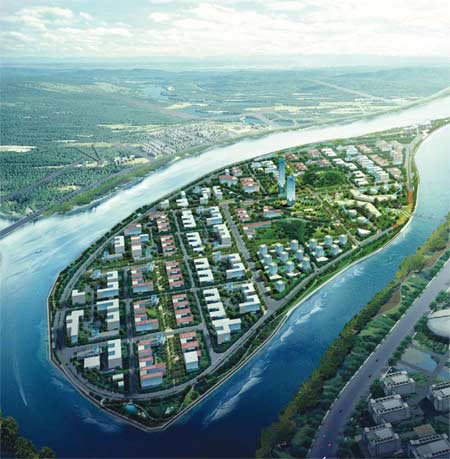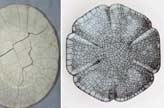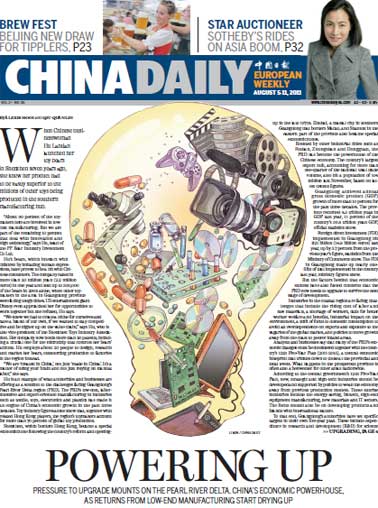Banking on biotech
Updated: 2011-08-05 11:35
By Alexis Hooi (China Daily)
One major project that the authorities are pushing to move the Pearl River Delta's industries up the value chain is the new Guangzhou International Biotech Island. At least 30 foreign and Chinese projects are already being planned at the biotech research center as part of efforts to boost the high-tech and tertiary sectors.
|
 A bird's-eye view of the planned Guangzhou International Biotech Island, which covers nearly 2 sq km. [Provided to China Daily] |
Key development fields being targeted for the area include the biomedical, modern traditional Chinese medicine and biological services sectors, with many of the island's enterprises involved in pharmaceuticals and genomics research. The island, which is being touted as the first national level scientific park in South China, covers nearly 2 square kilometers and is 12 km from the provincial capital's central business district. Preferential policies and incentives to develop the area will be provided on top of infrastructure and services support.
These include an annual science and technology fund of up to 300 million yuan (32.9 million euros) for "outstanding science and technology projects within the district" as well as research and development (R&D), housing and training subsidies. Policies and incentives to support intellectual property protection include a 3,000-yuan patent allowance, fee subsidy for each invention or patent application and other subsidies for domestic patents.
Tiger Tang, general manager of the Guangzhou International Biotech Island Investment and Development Co Ltd, says priority will be given to attracting talent.
"We want to draw the science entrepreneurs so that we can leverage market networking," Tang says.
To that effect, subsidies will be provided to key talent who make a significant contribution in science, technology, R&D and industrialization, with each key talent able to receive up to 70,000 yuan in three years. A one-time financial reward of 30,000 yuan will also be given to "excellent high-skilled workers".
Paul Thorning, director of Science Bridges China, a platform for collaboration on healthcare technology and pharmaceutical science based at the University of Bradford, United Kingdom, says the biotech island will provide an opportunity for the creation of new technologies and companies through partnerships across the globe.
"Guangzhou is absolutely a priority to the Chinese government in terms of its development. It starts with the relationships and with the science and the industries," he says.
"Guangzhou has some great strengths in some particular areas, like traditional Chinese medicine. It needs to be done in the right way, to fit into the right regulation frameworks. But I believe that in the next 20 years, we will see a transformation in healthcare, to more holistic, integrated approaches. Guangzhou has got an opportunity there. We are seeing more and more drug discovery linked to natural resources in Chinese medicine but also in marine biology and marine sources. The biotech island has got a lot of intellectual capital to build on."
"Once you've got those capabilities and mechanisms for bringing them together, then you see these companies and new technologies inhabiting the space," Thorning says.
"It takes more than a nice facility, it takes a really good strategy."
E-paper

Double vision
Prosperous Hangzhou banks on creative energies to bridge traditional and modern sectors
Minding matters
A touch of glass
No longer going by the book
Specials

Ancient plate broken
An ancient porcelain plate was accidentally destroyed during a research in the Palace Museum.

Selfless actions
A 20-year-old girl becomes an Internet star for giving her first kiss to a drowning old man.

Space race
Homebuyers are learning the hard facts of supply and demand: too many cars and too few parking spaces.
